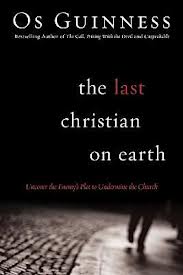The Last Christian on Earth (5): The Smorgasbord Factor**

At the heart of the modern mindset is a negative sort of freedom, “freedom from”—freedom from tradition, freedom from lasting commitments, freedom from a place, freedom from other people’s expectations, and so on. The absence of external constraints allows modern individuals to pursue their personal choices as the highest good. Hence, in this memorandum, the Deputy Director points out that “choice is not just a state of affairs but also a state of mind” in contemporary culture.
Choice has become a value in itself, even a priority. What matters is no longer good choice or right choice or wise choice, but simply choice. Freedom is simply having choice, and to be modern is to be addicted to choice and change. Choice and change become the very essence of life. …
What happens when choice becomes a state of mind? Obligation melts into option, “givenness” into choice, form into freedom, and duty into decision. Facts of life dissolve into fashions of the moment. But the consequence we care about most is this: The increase in choice and change leads to a decrease in commitment and continuity. …
In essence … the modern person/consumer scans the smorgasbord and says, “Their cuisines, their customs, their convictions are all now my choices, my options, my possibilities.” The widest range of choice is often at the most trivial levels, but the proliferation of choice at the more important levels is staggering.
Life is now a supermarket or smorgasbord with endless array of options, whether the choice is a question of a gender, a marriage, a hobby, a lifestyle, a world view or a religion. …
This brief overview summarizes the cultural backdrop for the third strategy for subverting the modern Church. The Deputy Director explains that “pluralization” is the technical term for this stratagem.
By pluralization, I mean the process by which the number of options in the private sphere of modern society rapidly multiplies at all levels, especially at the level of worldview, faiths and ideologies—decisively affecting the consciousness of what choice means and how the chooser sees it. The key feature here is not just variety but such extreme variety within a single society. …
The challenge of pluralism and the pressures of pluralization are not new to the Church. But as the Deputy Director points out, “the modern brand of pluralization is uniquely powerful.” It combines with the forces of secularization and the philosophy of postmodernism to undermine social cohesion—cohesion which is usually provided by religion.
[T]he traditional role of religion in society has been described as a “sacred canopy” or “global umbrella.” It overarched all of society and culture, defining the world and determining the way of life for those who lived under its shelter. What it denied was forbidden. What it ignored did not exist. What it affirmed as true was self-evident.
Do you see the contrast, and therefore the measure of our success today? In the modern world, pluralization sees to it that there is no sacred canopy, only millions of small tents. There is no global umbrella, only a bewildering range of pocket umbrellas for those who care to hoist one. The grand overseer of life has been reduced to being one of a jostling crowd of job seekers and volunteers, all competing for the consumer’s attention. The once-commanding symbol of unity has become just one more element in the abstract mosaic of diversity. Taken-for-grantedness has gone the way of the ancestors.
**A note on this series of posts: The literary device of The Last Christian on Earth is similar to C. S. Lewis’s Screwtape Letters. Here though, a master spy, the Deputy Director, writes a series of memos to an operative outlining strategies and giving instructions on how to subvert the modern Church. Os Guinness, an Oxford-trained sociologist, uses this device to help translate concepts from the social sciences into ideas that relate to faith and discipleship.


 November 26, 2012
November 26, 2012 







Comments are closed.